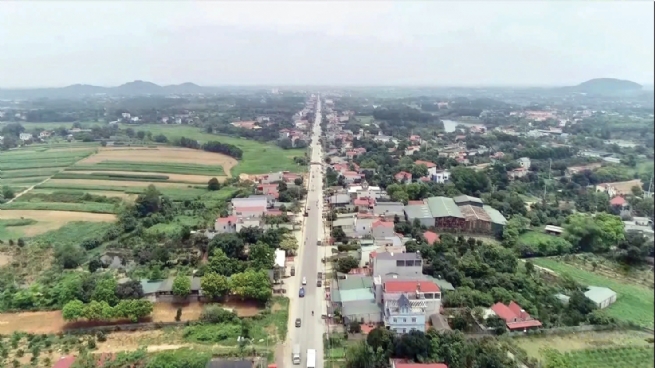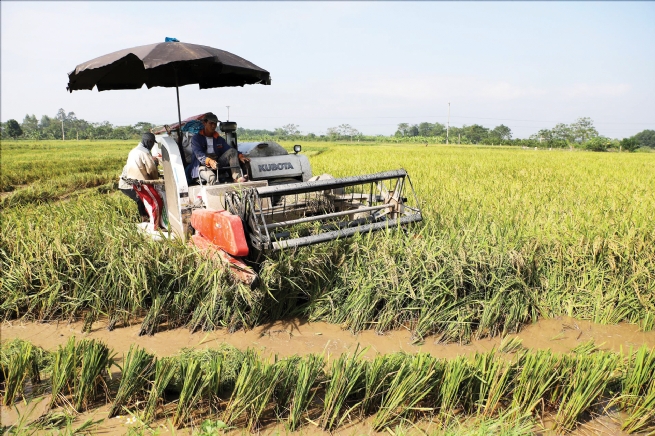The 5-year implementation of Program 04-CTr/TU is nearing completion, and Hanoi continues to drive rural development as the country enters the New Era - a time of national prosperity.

A corner of the Ba Vi district, Hanoi
Promoting new rural development
Director of the Hanoi Department of Agriculture and Environment, Nguyen Xuan Dai, said that although Program 04-CTr/TU has not yet completed its 5-year course, under the strong and thorough guidance of the City Party Committee, People's Council and People's Committee, and with the efforts of departments, branches, localities and people, many targets have been successfully met. Specifically, 21 out of 32 program targets have been achieved and exceeded, while 11 targets remain unmet but are specific to certain phases.
Hanoi has the third largest number of communes in the country. By implementing Program 04-CTr/TU of the Hanoi Party Committee, the city had all 382 communes meeting new rural standards by the end of 2021, completing this target four years ahead of schedule. In just three years (from 2021 to 2023), the remaining 11 districts were recognized by the Prime Minister as meeting new rural standards, bringing 100% of districts and towns up to standard and completing the rural development task two years ahead of the Program’s deadline.
By the end of 2024, Hanoi had 229 out of 382 communes meeting advanced new rural standards, exceeding the Program 04-CTr/TU target by 73 communes, and 109 communes meeting model new rural standards, exceeding the target by 29 communes. Despite socio-economic development, the three villages of Binh Vong, Van Hoi and Van Giap - with over 3,600 households in Van Binh commune (Thuong Tin district) - still maintain their rural character and traditional cultural beauty. Van Binh commune is home to Van Tu Thuong Phuc, a site preserving the tradition of scholarship and mandarin education in Thuong Tin, along with ancient pagodas such as Phap Van Pagoda (Van Giap village), Phuc Hoi Pagoda (Van Hoi village) and Bao Quoc Pagoda (Binh Vong village).
According to Ngo Dinh Tien, Chairman of Van Binh Commune People's Committee, since the development of new-style rural areas, the lives of Van Binh residents have improved both materially and spiritually. The Binh Vong village library holds over 15,000 books and newspapers, attracting many readers. By the end of 2024, the commune was officially recognized by Hanoi city as having completed the construction of a model new rural area.
Hanoi has submitted a dossier to the government requesting assessment and recognition for completing the task of developing new-style rural areas. Additionally, five districts namey Thanh Tri, Gia Lam, Hoai Duc, Thanh Oai and Dong Anh have been recognized by the Prime Minister as meeting advanced new rural standards. The development of new-style rural areas in Hanoi has been deep, effective and sustainable, with many indicators exceeding government regulations and reflecting Hanoi’s unique identity. Economic and social infrastructure has been synchronously invested, with 100% of district, inter-commune, village, inter-village and alley roads asphalted or concreted; and 100% of villages and hamlets equipped with cultural houses and community activity points, Mr. Nguyen Xuan Dai added.

Advancing digital transformation in rural areas
Hanoi has the largest and second largest rural areas in the country. To increase incomes and reduce the rural-urban gap, the city has prioritized investment in districts through the New Rural Development Program, including digital transformation. Currently, Hanoi is focusing on implementing digital transformation simultaneously across three pillars: Digital Government, Digital Economy and Digital Society. In rural areas, many digital solutions have been introduced and are being promoted to help villages become more civilized and modern. Ms. Nguyen Thi Thanh Hue, owner of Thanh Hue production facility (Lien Hong commune), said: “With the support and guidance of a TikToker, I ‘closed the order’ for 600 cakes in just about 10 minutes of livestreaming. This was my first time selling on TikTok, and everything went very smoothly, opening up a new sales channel.”
According to Tran Duc Hai, Secretary of Dan Phuong District Party Committee, digital transformation is seen as a key trend and a crucial, urgent solution that forms the foundation for developing and implementing local socio-economic programs and plans. Dan Phuong has fully understood, specified, institutionalized and simultaneously issued resolutions, programs, and plans to support digital transformation in the district. This has established clear, effective and feasible roadmaps for each year and the overall period. Recently, Dan Phuong continued to develop and launch a commune-level digital transformation model, promoting the use of information technology and digital transformation within the local government system.
Digital transformation is currently progressing strongly in rural areas, impacting all sectors. The “Smart Villages” models aimed at building “Smart Communes” are now present in many parts of Hanoi, marking a clear advancement in how Program 04-CTr/TU of the City Party Committee is implemented compared to earlier phases. The active role of the people as the main drivers of the capital’s socio-economic development has been firmly established. Rural areas are becoming increasingly modern and civilized. Many residents have proactively embraced digital platforms for industrial production, handicrafts, farming and animal husbandry. They have also become skilled in product promotion, setting up booths, selling online, managing orders and making electronic payments.
In the near future, Hanoi plans to pilot the initiative “Each farmer is a trader, each cooperative is a business applying digital technology.” The goal is to guide and train every farmer to use digital technology in production, supply, distribution and forecasting of agricultural products. This will help build and develop a digital agricultural ecosystem that encourages participation in digital transformation by both individuals and businesses, Mr. Nguyen Xuan Dai shared.
By Bao Ngoc, Vietnam Business Forum
| This special section is supported by Hanoi Coordination Office of the New Rural Development Program |